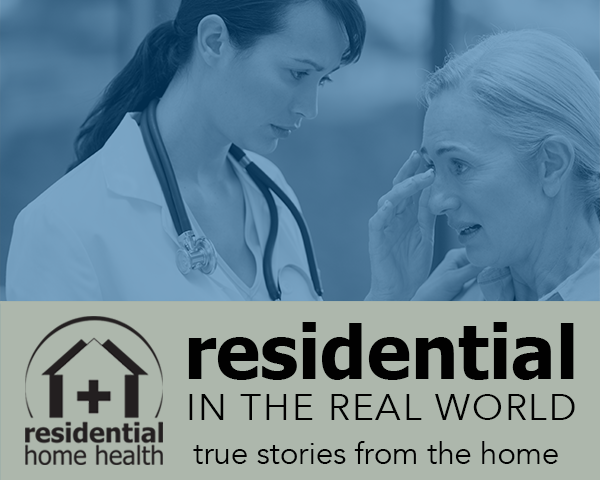 Clinicians draw on many different skills.
Clinicians draw on many different skills.
First, nurses and therapists must have a background of solid medical knowledge and training. The demands of real-time care may include keen observation, quick thinking, and calm in a crisis. Teaching expertise helps patients learn about their conditions and how to manage them. Another critical skill is empathy, the ability to recognize why the other person feels the way she does, in an effort to address her particular needs.
The Residential Home Health patient in this story did need skilled medical care, but she was also troubled by something else. Read on to discover how Mandy, a Residential nurse and case manager, used empathy to get to the root of her patient’s distress — and took the time to restore her assurance and confidence.
Anxious and Discouraged
The patient was beginning care with Residential Home Health after suffering a large bowel obstruction, which had led to colostomy surgery. This procedure, which is performed in some cases of intestinal or colon disease, artificially re-routes the large intestine through the abdomen and into an attached medical receptacle. The patient needed post-operative care and assistance while learning to manage the new equipment (called an ‘ostomy appliance’).
When Mandy first arrived at the home, she found a visibly upset patient. The patient’s apparatus had malfunctioned less than 48 hours after the last equipment change, unfortunately during a social visit. Naturally, the patient was embarrassed about the incident, but she was also expressing feelings of frustration that suggested there was more to the issue.
Open and Attentive
Rather than jump right in and fix things, Mandy took the time to listen and interact, and she realized that what her patient needed was more than a quick repair. She learned by listening that her patient’s main source of upset was feeling reliant on the assistance of others. The patient wanted to feel capable of maintaining her condition herself, and the malfunction had her doubting her ability to stay independent at home.
Before doing anything else, Mandy sat and talked the patient through the entire equipment change process. She found that the patient was in fact well-informed about her condition and understood the correct procedure for changing an ostomy appliance; lack of understanding was not the issue. Mandy would need to investigate more to learn why the patient was having this problem.
Next, Mandy began to work on the patient, to uncover what had gone wrong and figure out how it could be avoided. The seal on the apparatus was intact — further indication that the patient was well informed and capable of managing the equipment herself. However, the patient’s specific body shape and health history revealed a few challenge areas, which were making it difficult for her to see what she was doing. Mandy assured the patient that they just had some variables to work around, and that her Residential Home Health Care Team would help her to find options that worked better.
Thorough and Reassuring
During their visit, Mandy provided her patient with information, medical care, and encouragement for more than 2 hours. By taking the time to gauge the patient’s understanding and carefully assess her personal challenges, Mandy was able to relieve her anxiety and restore confidence in her ability to manage her condition. In a reversal from the beginning of their visit, the end result was a patient grateful to feel more like herself again — knowledgeable, capable, and independent.
No matter what your health challenge may be, Residential Home Health offers a range of services to help you work toward your health goals safely at home. Call (888)930-WELL (9355) to discuss your specific situation with a Home Care Specialist today, or click the link below to take our 60-second, 15-question Home Care Assessment.
{{cta(‘3073a01b-4a0b-41c6-91c0-460ecd8e3277’)}}

